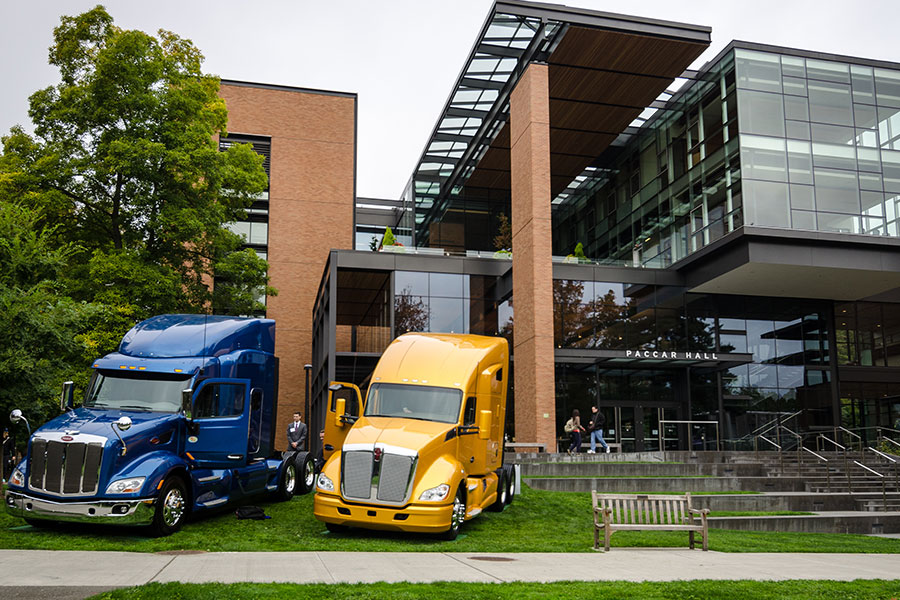Business leaders in the classroom: lessons from the Golden Triangle

From PACCAR day 2014: two Kenworth trucks in front of PACCAR Hall
If you ask most former students what their most significant experiences were in college, they may say studying abroad, meeting their future spouse, or the day they received their diploma. Many of you will be shocked to hear that one of my most significant experience revolves around a conference call with a man in Mississippi.
This winter quarter, I enrolled in Management 320: Business, Government, and Society, with Professor Tod Bergstrom. This course helps students develop an ethical conscience towards business and realize the implications that decisions have on society. I signed up for Professor Bergstrom’s section because he is known to invite a diverse group of guest speakers to his class throughout the quarter.
In preparation for an upcoming guest lecturer, we were assigned to watch a CBS: 60 Minutes special on “The Golden Triangle.” The Golden Triangle consists of three cities in Eastern Mississippi that were once a hotbed for manufacturing and industrial labor. Unfortunately, economic events like the 2008 Recession forced most factories to shut down, leaving the region with unemployment rates as high as 20%. Most remaining jobs were also very low paying. The Triangle needed a hero desperately as many lost hope in their economic futures.
This was the whole reason why I took the class: to gain cutting edge perspectives on the business world around me
The hero they received was economic developer Joe Max Higgins. He brought a winning mentality back to the Golden Triangle through his aggressive drive for success. His license plate reads “2EQLAST.” like Ricky Bobby’s motto from Talladega Nights: “If you ain’t first, you’re last.” Despite everyone telling him it couldn’t be done, Higgins convinced PACCAR, Steel Dynamics, and Yokohama Tires to build manufacturing plants in Eastern Mississippi, directly generating 5,000-10,000 new jobs. Higgins is a business rock star. He drowned out the noise of everyone who told him he’d never succeed, and rebuilt the economy of the Golden Triangle. Higgins is the Russell Wilson of job growth.
What happened in lecture later that evening transpired into something truly special. Professor Bergstrom explained we would have a conference call with Joe Max Higgins himself, followed up by a presentation from PACCAR executive George Kerekes, who was a part of the team that agreed to build a plant in the Golden Triangle.
My face lit up like a Christmas tree. I couldn’t believe our class was about to gain first-hand knowledge on what it took to rebuild the Golden Triangle. This was the whole reason why I took the class: to gain cutting edge perspectives on the business world around me. When the time came, I ran to be the first in line for Q&A. I was so nervous I could barely formulate my question. You have to understand, Higgins is a very, very big deal nationally, and I didn’t want to mess up this opportunity.
Joe Max Higgins and George Kerekes opened my mind to the impact that job growth has on society
I asked Higgins, “What did the influx of new manufacturing jobs and wealth do for the region?” His answer amazed me. He explained that the communities gained several new hotels, strip malls, fast food restaurants like Taco Bell and Burger King, craft stores like Hobby Lobby, as well as other new companies to support the factories (like material suppliers). Not only did the Golden Triangle gain thousands of manufacturing jobs, it also gained several thousand other diverse employment opportunities. It is amazing how exponential job growth can be.
George Kerekes offered us reasons for why PACCAR decided to build in Mississippi. One of the key reasons was the presence of post-secondary education institutions. Kerekes personally traveled to East Mississippi Community College to set up programs that train local people to perform skilled manufacturing jobs. The PACCAR facility is state-of-the-art and relies heavily on computers and robots requiring specialized training to operate. The community college benefits from having more students enrolled, and PACCAR benefits from having skilled workers in their manufacturing plant.
Kerekes also said that job retention in the Mississippi plant is the highest out of all locations in the United States. Employees are extremely happy to work at the new PACCAR facility. It also pays workers significantly more money than they made at previous jobs. They can now afford more for their families and live in nicer homes in safer neighborhoods. People who may not have grown up with many opportunities can now send their children to college. Those are effects we will see manifest in the next few decades.
Joe Max Higgins and George Kerekes opened my mind to the impact that job growth has on society. They both believed in one of the poorest parts of the country when no one else did, and proved that job creation leads to more job creation. People who were once born with little hope for a bright future now have more opportunities in employment than they had ever thought possible.
Guest post by Max Sidell, current Foster undergrad.
